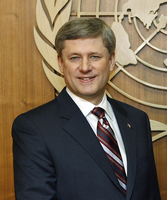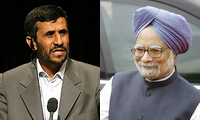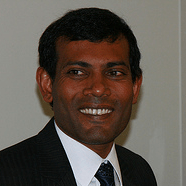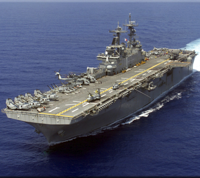Canadian Prime Minister Stephen Harper traveled to China earlier this month, where he met with senior Chinese leaders and signed deals promoting bilateral economic cooperation. In an email interview, Daniel Poon, a researcher at the North-South Institute, discussed trade and diplomatic relations between Canada and China. WPR: What is the nature and extent of energy relations between Canada and China, and how are they evolving? Daniel Poon: Due to years of prioritizing the U.S. market over all others, the extent of Canadian energy and, more generally, commercial relations with China have been relatively limited. In 2010, roughly one-third of Canada’s […]
Latest Archive
Free Newsletter

At first glance, the ongoing efforts to remove Bashar al-Assad from power in Syria and the unrecognized referendum held in the majority-Serbian areas of northern Kosovo would not appear to have much in common. But both are symptoms of a larger problem that has accelerated in recent years: the delegitimization of the territorially defined state. The classic definition of a state in the international system, as provided by Max Weber and incorporated into international law by the 1933 Montevideo convention, gives the national government the exclusive right to use force to secure its existence and territory. But that norm is […]

TORONTO — Wrapping up a trip to China last week, Canadian Prime Minister Stephen Harper described the visit as “very successful.” The trip saw the signing of a number of trade deals worth an estimated $3 billion in oil, natural gas, minerals and other products. But though it also ended with the commissioning of a feasibility study into the possibility of a free trade agreement between the two countries, Harper was quick to advise caution on what remains a long-term goal. That the two economies need each other is not in question. With bilateral trade valued at $50 billion in […]
All eyes have been on Chinese Vice President Xi Jinping this week, as the heir apparent to Chinese President Hu Jintao continues his tour of the United States. But Xi will not be the only new face to emerge this fall, when the Chinese Communist Party will convene its 18th National Party Congress to announce a new generation of leaders in the top party and government positions. The congress convenes every five years to announce changes in policy or to make changes in personnel. But this year, the political transition is particularly important, with more than half of the 25 […]

When a bomb attached to an Israeli diplomat’s car exploded in New Delhi earlier this week, it not only injured at least four people, it also seriously damaged India’s hopes of staying out of the conflict over Iran’s nuclear program. There is no confirmation that the attack was carried out by Iran or its ally Hezbollah, as Israel maintains. Still, the incident points to the increasingly untenable efforts by Indian officials to simultaneously nurture close ties with the U.S and strengthen relations with Israel, while maintaining valuable ties with Iran in the face of U.S. and international sanctions. At the […]
The International Committee of the Red Cross (ICRC) assisted in the release last week of 29 Chinese hostages held in Sudan, taking a role in the negotiations and handling the physical transfer of the hostages. In an email interview, David Forsythe, a professor of political science at the University of Nebraska-Lincoln, discussed the ICRC’s involvement in international conflicts. WPR: What role has the ICRC historically played in humanitarian and conflict situations, as well as hostage situations? David Forsythe: Since 1863 the ICRC has tried to play a leading humanitarian role in armed conflict and other situations of violence like domestic […]

Deposed President Mohamed Nasheed’s ouster was a defeat for democracy and a victory for conservative Islamism in the Maldives. But the resulting political instability in the Indian Ocean archipelago threatens to exacerbate regional rivalries in which the strategically located island nation has increasingly figured. The apparent coup d’état on Feb. 7 was triggered by Nasheed’s move to arrest the chief justice of the Criminal Court, Abdulla Mohamed. Nasheed accused Mohamed of blocking a graft probe against Abdul Maumoon Gayoom, who ruled the Maldives for 30 years until Nasheed unseated him in the country’s first democratic election in 2008. But the […]
After years of controversy and disagreement, the U.S. and Japan agreed last week to decouple the terms of an agreement to close the U.S. Marines’ Futenma air base in Okinawa, after negotiations over relocating the base elsewhere on the island had reached a stalemate. The 2006 agreement had required the relocation of Marine Corps Air Station Futenma to another site on Okinawa as a precondition for reducing the amount of U.S. troops stationed there. But heavy opposition among residents of Okinawa to hosting a new base, even in a less populated part of the island, had made the issue a […]
Brazilian President Dilma Rousseff made her first official visit to Cuba last month. In an email interview, David Herrero, a research associate at the Council on Foreign Relations, discussed Brazil-Cuba relations. WPR: How did Brazil-Cuba relations evolve under former Brazilian President Luiz Inacio Lula da Silva, and what were Brazil’s priorities? David Herrero: Lula significantly expanded political engagement and commercial ties with Cuba. He visited the country four times as president and helped launch a $950 million modernization project — financed mostly by Brazil’s development bank, BNDES — at the Cuban port of Mariel. On the issue of human rights, […]

Over the past two weeks, the U.S. Navy and Marine Corps conducted Bold Alligator, an exercise off the Atlantic seaboard designed to refine expertise in amphibious operations and test new amphibious capabilities. The exercise included the USS Enterprise supercarrier, three amphibious assault vessels — the USS Wasp, the USS Kearsarge and the USS Iwo Jima — as well as a bevy of support vessels. Nine international partners joined Bold Alligator in some fashion, including Australia, Canada, France, Germany, Italy, the Netherlands, New Zealand, Spain and the United Kingdom, with the French LPD Mistral representing the most significant allied commitment. The […]

Since returning to civilian rule in April 2011, Niger has achieved a measure of political stability. In July, President Mahamadou Issoufou weathered his first major domestic crisis, a coup attempt, whose plotters were arrested by authorities soon thereafter. The president recently increased the salaries of civil servants and reduced the costs of electricity and water, moves calculated to address economic grievances. Critically for this impoverished country, external donors regard Issoufou’s administration favorably; aid suspended after the February 2010 coup that removed former President Mamadou Tandja from power has been restored or increased. Finally, a small amount of oil — around […]
When South Sudan seceded from Sudan, it took three-quarters of Sudanese oil production with it, and the two countries have disputed oil revenues and transit fees ever since. Because South Sudan lacks oil infrastructure, it must transport its oil northward through existing pipelines to Sudan’s Port Sudan, on the Red Sea, where there are refineries and loading facilities for tankers. Seeking other options for oil exports, the landlocked country is now considering building an oil pipeline through Ethiopia and Djibouti, and signed an agreement last month to link its oil fields with a coastal town in Kenya. “Any sane or […]
